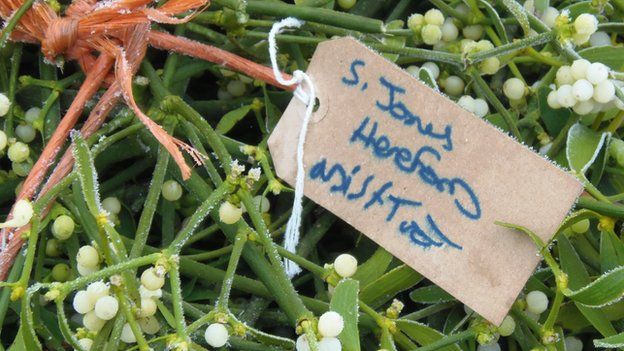Tenbury Wells: Centuries-old romance with mistletoe
-
Published

Over the next week, buyers will travel hundreds of miles to get their hands on mistletoe, the parasitic plant responsible for many a romantic Christmas liaison. But how did one market town become the UK's trading centre for the festive foliage?
Tenbury Wells sits alongside the River Teme where Shropshire, Herefordshire and Worcestershire meet - the three counties, experts say, which provide some of the best growing grounds for mistletoe.
The plant loves fruit trees to attach itself to, and the large number of orchards in Herefordshire and Worcestershire were thought to play a large part in the abundance of mistletoe in the area.
But that is just a popular myth, according to Jonathan Briggs, an authority on mistletoe whose consultancy Mistletoe Matters provides information and advice on all aspects of the plant in the UK.
"There are lots of apple orchard areas elsewhere in Britain that don't have mistletoe," he said.
"The answer is climate - it only thrives in areas with patterns of low winter temperatures and high summer ones."
Obviously, Tenbury does not have its own microclimate - so how has the town become more synonymous with mistletoe than the rest of the region?
Historian Jane Vyer thinks it could be partly down to luck.
"Mistletoe auctions were probably a common sight in the area from the mid-19th Century, especially in market towns which would have a weekly livestock or vegetable sale anyway," she says.
"And in the way that things go, the more popular auctions survived longer than others.
"Once a venue was a favourite, it would naturally suck away at the popularity of the rest, and when an event starts to get a reputation for something in particular, it just snowballs.
"Just like there is no real reason, other than tradition, to associate Appleby Fair with horses - after all, you can sell horses anywhere - its reputation maintains the brand."
Mistletoe embroidery
And Tenbury's residents have embraced the brand of "mistletoe capital". When the town's annual auction was threatened with closure, they fought to keep the link.
For more than 100 years, mistletoe and holly sales were based at the town's cattle market but nearly disappeared when the site was sold for development in 2004.
Nick Champion, Tenbury's mistletoe and holly auctioneer for more than 35 years, kept the sale alive by moving it over the border to Herefordshire for four years.
In response, a group of local people set up the Tenbury English Mistletoe Enterprise (TEME) to revive Tenbury's traditional status as the mistletoe-trading capital of the UK.
Traders jumped at the opportunity to tempt buyers, and almost every shop in the town is decorated with mistletoe - photographs, drawings and paintings of mistletoe, mistletoe embroidery, and also poems and factsheets about mistletoe.
In 2005, TEME organised a mistletoe festival and established 1 December as the official Mistletoe Day, endorsed in Parliament by MPs.
The group estimated the festival this year drew more than 500 extra people into the town.
Mr Champion said he thought the demand for mistletoe today was not as great as it was 30 years ago, and that the prices generally were lower.
"Last year was a dreadful year, it was hardly selling at all," he said.
"But this year we had more first-quality mistletoe, with lots of berries on.
"You need a lot of berries for top prices."
Caroline Palethorpe, festival project manager and member of the Tenbury Mistletoe Association, said the extended cold period in February and March was ideal for early pollination of the plants.
"Mother Nature must have known that we all deserve a good Christmas to end 2013," she added.
And this year's prices reflect the increase in quality. They are double that of 2012, with a top price of £4 a kilogram.
Once the buyers make the mistletoe into wreaths and split it into sprigs, it will sell for 10 times the price they got it for.
For millennia, Britain's native species, Viscum album, has been brought into homes in the depths of winter, partly because of its decorative qualities.
For the Romans, mistletoe represented peace, love and understanding and was hung over doorways to protect the household, said historian Jane Vyer.
She said it was then adopted by Celts and druids as a fertility symbol, which is probably where the tradition of kissing underneath mistletoe stems from.
And the modest Victorians at least used mistletoe to flirt under.
Mark Adams, an arable and livestock farmer from Eastham, about five miles outside Tenbury, gets extra profits from the mistletoe his farm attracts and sells it online.
"The money from mistletoe is negligible really," he said.
"You couldn't survive on it, no way.
"But it's growing there and you may as well take advantage of that."
Wholesale, he charges £35 for 50 sprigs (about 3.5kg or 7lb 11oz), going up to £215 for 450 sprigs (about 30kg or 5st).
Individual customers pay about £8.45 for 10 sprigs.
John Smith has gone to the auction since he was a young boy, when he helped his grandfather.
"You see the same people here year after year," he said.
"There are a couple of old ladies, sisters, who've been coming up from Carmarthenshire for more years than I can remember."
'Romance sells'
Every year Lottie Foster drives for four hours from Brighton with a seven-tonne lorry.
She bulk-buys the plant and then sells it on at London's Covent Garden.
"I make it up into little bunches and put a ribbon on and sell it mainly to young courting couples - I can sell a little bunch like that for a fiver," she said.
"I may sound cynical, but romance brings in some good money.
"Romance sells, and the only place to buy it is here. It's the mistletoe capital of Britain."
-
-
Published2 December 2013
-
-
-
Published30 November 2013
-